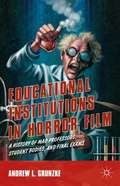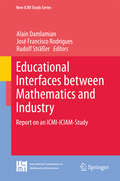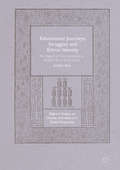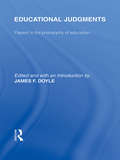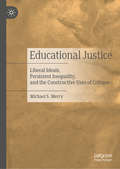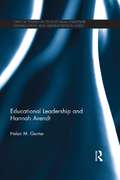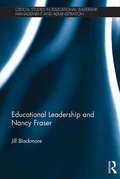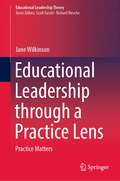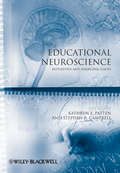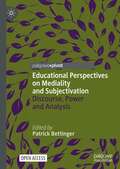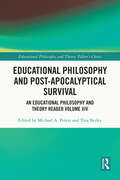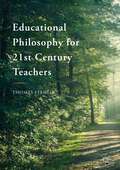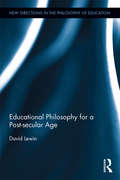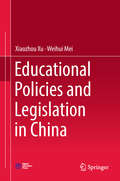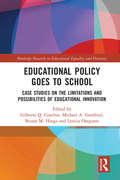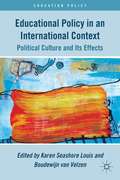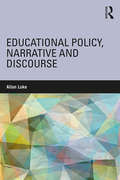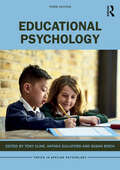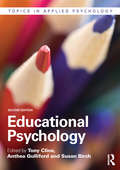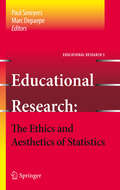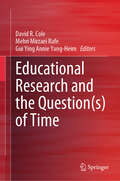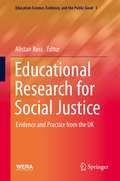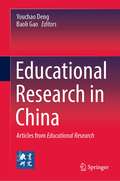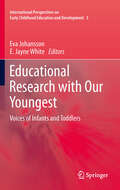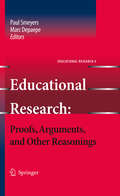- Table View
- List View
Educational Institutions in Horror Film: A History of Mad Professors, Student Bodies, and Final Exams
by Andrew L. GrunzkAn exploration of how educational institutions have been portrayed in horror film, this book examines the way that scary movies have dealt with the issue of school violence, focusing on movies set in high schools, colleges, and summer camps.
Educational Interfaces between Mathematics and Industry
by Alain Damlamian José Francisco Rodrigues Rudolf SträßerThis book is the "Study Book" of ICMI-Study no. 20, which was run in cooperation with the International Congress on Industry and Applied Mathematics (ICIAM). The editors were the co-chairs of the study (Damlamian, Straesser) and the organiser of the Study Conference (Rodrigues). The text contains a comprehensive report on the findings of the Study Conference, original plenary presentations of the Study Conference, reports on the Working Groups and selected papers from all over world. This content was selected by the editors as especially pertinent to the study each individual chapter represents a significant contribution to current research.
Educational Journeys, Struggles and Ethnic Identity
by Xinyi WuThis book examines how state schooling in China has economically, culturally, and ideologically had an impact on and gradually transformed a traditional Muslim Hui village in rural Northwestern China. By discussing the interpretation and appropriation of dominant educational discourse of "quality" in the rural context, it illustrates the dichotomies of poverty and prosperity, civility and uncivility, and religiosity and secularity as they are perceived and understood by teachers, parents and students. Based on an original ethnographic research conducted in a secondary school, it further touches upon Muslim Hui students' negotiations of filial, rural, and ethnoreligious identities when they struggle to seek a life of their own in the journey to prosperity. The book introduces audiences to multiple ways in which Muslim Hui students construct and negotiate identities through state schooling, especially the educational heterogeneity experienced by various Muslim youth. It also captures the changing rural-urban dynamic as state schooling continues to guide local formal educational activities as well as create tensions and confusions for both teachers and parents. Most importantly, the book challenges stereotypes about Muslim Hui students in Northwest China being assimilated into the mainstream culture by demonstrating how local Muslims live, study, pray, and fulfil the five pillars of Islam. It will be highly relevant to students and researchers in the fields of education, anthropology, sociology, and religious studies.
Educational Judgments (International Library of the Philosophy of Education Volume 9): Papers in the Philosophy of Education
by James F. DoyleThe topics covered in this volume, originally published in 1973, include the need for a more adequate concept or definition of education, the issue of whether indoctrination is compatible with education, particularly with moral education, and the processes of judging the merits of different approaches to aesthetic education. Two contributors present complementary analyses of the relations between freedom as a characteristic of institutions and the process of learning to be a free man. There is discussion of the neglected subject of rights and duties in education, with special emphasis on the question of a universal right to education. The volume concludes with papers on the relevance of philosophy to the practical judgments of educators and to education as a field of study.
Educational Justice: Liberal Ideals, Persistent Inequality, and the Constructive Uses of Critique
by Michael S. MerryThis book examines the philosophical, motivational, and practical challenges of education theory, policy, and practice in the twenty-first century. There is a loud and persistent drum beat of support for schools, for citizenship, for diversity and inclusion, and increasingly for labor market readiness with very little critical attention to the assumptions underlying these agendas, let alone to their many internal contradictions. Merry does not neglect the historical, comparative international context so essential to better understanding where we are, as well as what is attainable in terms of educational justice. He argues that we must constructively critique some of our most cherished beliefs about education if we are to save the hope of real justice from the rhetoric of imagined justice.
Educational Leadership and Hannah Arendt (Critical Studies In Educational Leadership, Management And Administration Ser.)
by Helen M. GunterThe relationship between education and democratic development has been a growing theme in debates focussed upon public education, but there has been little work that has directly related educational leadership to wider issues of freedom, politics and practice. Engaging with ELMA through the work of Hannah Arendt enables these issues of power to be
Educational Leadership and Nancy Fraser: Nancy Fraser And Iris Marion Young (Critical Studies in Educational Leadership, Management and Administration)
by Jill BlackmoreDrawing on the work of Nancy Fraser, this book offers a critical view of contemporary educational leadership and reform discourses, exploring how her key concepts of redistribution, recognition and representation may apply to social and therefore educational justice. Fraser offers a political and pragmatic reconciliation between feminist, neo-Marxist, critical and post-structuralist theories. This book outlines how Fraser has worked on and worked over theories of social justice and how this can inform how we can understand educational theory, policy and practice generally. In particular, the book focuses on the field of educational administration and leadership (ELMA) as it relates to equity issues such as school choice and inequality, gender and inclusive leadership, and alternative schooling. Fraser’s argument about ‘scaling up’ social justice theory is shown to be highly salient given the emergence of the field of transnational education policy and its role in the context of intensified nation-state and edu-business competition. Overall, through the lens of Nancy Fraser’s unitary framework, this book considers epistemological questions about the nature of knowledge, examines the relationship between the state, the individual, education and social movements, addresses the difficulties and dilemmas which arise due to the intersections of gender, class, race, sexuality and culture in a globalized context, and illustrates how the principles of social justice can be mobilized by leaders in everyday practice. Educational Leadership and Nancy Fraser is an illuminating read for those policymakers, researchers and practitioners engaged in the field of educational administration, leadership and social justice.
Educational Leadership through a Practice Lens: Practice Matters (Educational Leadership Theory)
by Jane WilkinsonThis book provides the theoretical and analytical resources for an urgent rethinking of the social project of educating and educational leading. It examines what educational leadership is, namely the politics and power of leadership as a practice, and what it can and should be, offering a pedagogical and praxis-informed approach to educational practice. Drawing on research conducted at various Australian schools and education districts, it argues for a reframing of educational leadership as pedagogical practice/praxis to transform theorising and practice in the field. The book provides a rich account of educational leading through a practice lens, bringing into dialogue the theory of practice architectures with site ontologies, Bourdieu’s thinking tools and feminist critical scholarship.The book tracks the practices and praxis of educational leaders as they grapple with the changing landscape and forces of educational policies that have informed Australian education. It reimagines education leadership by integrating Continental and Northern European understandings of pedagogy and praxis as being morally and ethically informed, as opposed to the narrower Anglophone notions of pedagogy as teaching and learning. The book adds to the body of knowledge on the “actual work of leadership” as a “distinct set of practices” that is morally and ethically informed. Readers will find a more holistic understanding of educational leadership practice and praxis, based on the everyday accounts of educational leaders, teachers and students in schools and education districts.
Educational Neuroscience: Initiatives and Emerging Issues (Educational Philosophy and Theory Special Issues #25)
by Kathryn E. Patten Stephen R. CampbellEducational Neuroscience provides an overview of the wide range of recent initiatives in educational neuroscience, examining a variety of methodological concerns, issues, and directions. Encourages interdisciplinary perspectives in educational neuroscience Contributions from leading researchers examine key issues relating to educational neuroscience and mind, brain, and education more generally Promotes a theoretical and empirical base for the subject area Explores a range of methods available to researchers Identifies agencies, organizations, and associations facilitating development in the field Reveals a variety of on-going efforts to establish theories, models, methods, ethics, and a common language
Educational Perspectives on Mediality and Subjectivation: Discourse, Power and Analysis (Palgrave Studies in Educational Media)
by Patrick BettingerThis open access book examines the complex relationship between education, media and power. Exploring the entanglement of education media and power structures, the contributions use various examples and case studies to demonstrate how subjectivation processes and digital structures interact with one another. The book asks which modes of subjectivation can be identified with current media cultures, how subjects deal with the challenges and potential of digitality, and how coping and empowerment strategies are developed. By addressing theoretical as well as empirical evidence, the chapters illuminate these connections and the subsequent significance for media education more widely.
Educational Philosophy and Post-Apocalyptical Survival: An Educational Philosophy and Theory Reader Volume XIV (Educational Philosophy and Theory: Editor’s Choice)
by Michael A. Peters Tina BesleyThis collection concerns educational philosophy and post-apocalyptical survival. This 14th volume in the Editor's Choice series provides insights into the philosophy of education as it relates to the concepts of civilizational collapse, discourses of decline, educating for survival amid climate emergency, cultural apocalypse and the pandemic. It is based on a series of editorials and articles published in the Educational Philosophy and Theory journal through its 55-year history. The articles, written by Editor Michael Peters and colleagues, explore the concept of global apocalypse from the educational philosophy lens. It will be of interest to scholars in philosophy of education and anyone who is working in the field of post-apocalyptic studies.
Educational Philosophy for 21st Century Teachers
by Thomas StehlikThis book explores education in the 21st century in post-modern Western societies through a philosophical lens. Taking a broad perspective of education and its attendant terminology, assumptions, myths and influences; the author examines why we teach as opposed to how. In doing so, he includes not only teachers, but all adults who are involved in bringing up children. Applying philosophical theories throughout history to present day practice, this volume is sure to be a useful resource not only for teachers who are just starting out, but those with an interest in education in the past, present and future. This wide-ranging book will be valuable for educators, parents and educational policy makers, and all those who believe it takes a village to raise a child.
Educational Philosophy for a Post-secular Age (New Directions in the Philosophy of Education)
by David LewinEducational Philosophy for a Post-secular Age reinterprets post-secular insights for educational theory by recognising that the persistence of religion in contemporary life raises new questions about the place of religion in education. Two common assumptions are critically examined: first, that the better educated a society becomes, the more secular it becomes, and second, that religion can and should be separated from public education. For too long, religion has had an uneasy relationship with education, being seen either as a foreign invader, a problem to be solved, or as a mechanism by which to reinforce particular religious, cultural or national identities. In order to move educational theory beyond the debates about indoctrination and competing rights between parents, children and nation states, the argument undercuts rationalist conceptions of religion and education that tend to frame the debates in terms of competing truth claims or worldviews. Drawing on a diverse range of theological, philosophical and educational sources, this book demonstrates the continuing significance of the Christian mystical tradition to educational theory. It proposes an exploration of democratic education that brings together two apparently irreconcilable poles: the meaning of religion in education and contemporary life, and the need for a deliberative democratic process that is fit for the post-secular age. It argues that religious literacy can be served by democratic encounters in public religious education. Educational Philosophy for a Post-secular Age will be of interest to researchers, academics and postgraduate students in the fields of the philosophy of education, philosophy of religion, education policy, politics, anthropology and cultural theory. It will particularly appeal to those, of both secular and religious persuasions, interested in the place of religion in education and public life.
Educational Policies and Legislation in China (Zhejiang University Press Ser. #2)
by Xiaozhou Xu Weihui MeiThis book provides a comprehensive overview of the development of educational policies and legislation in China, particularly following the introduction of Reform and Opening Up in 1978. The scope of this book: (1) provides the theoretical basis and framework of educational policies; (2) explains key educational laws and legislation; and (3) introduces readers to policies for educational internationalization, private education, lifelong learning and teacher education. The book is intended for researchers, teachers and graduate students in the field of comparative education, educational policy and legislation, educational management. Readers will find essential information on the most important educational laws and legislation, as well as the recent characteristics of and trends in educational policies in China.
Educational Policy Goes to School: Case Studies on the Limitations and Possibilities of Educational Innovation (Routledge Research in Educational Equality and Diversity)
by Gilberto Q. Conchas Michael Gottfried Briana M. Hinga Leticia OsegueraEducational policies explicitly implemented in order to reduce educational gaps and promote access and success for disenfranchised youth can backfire—and often have the unintended result of widening those gaps. In this interdisciplinary collection of case studies, contributors examine cases of policy backfire, when policies don’t work, have unintended consequences, and when policies help. Although policy reform is thought of as an effective way to improve schooling structures and to diminish the achievement gap, many such attempts to reform the system do not adequately address the legacy of unequal policies and the historic and pervasive inequalities that persist in schools. Exploring the roots of school inequality and examining often-ignored negative policy outcomes, contributors illuminate the causes and consequences of poor policymaking decisions and demonstrate how policies can backfire, fail, or have unintended success.
Educational Policy in an International Context
by Karen Seashore Louis Boudewijn Van VelzenProvides a provocative examination of the interplay between political culture and educational policy. The goal is to provide a better understanding of how different countries are responding to the global exchange of policy ideas that includes 'the standards movement' and 'new public management' or accountability in the public sector.
Educational Policy, Narrative and Discourse
by Allan LukeThis collection of Allan Luke’s key writings on educational policy, curriculum, and school reform follows the development and use of critical discourse analyses to study educational policy and practice. Turning to a series of narrative analyses of the relationship between politics, culture, economics, and education, Luke‘s writings address the challenges of shifting from an academic and scientific critique of policy to ‘getting your hands dirty’ in the making of state educational policy. The volume includes international examples of policy formation for social justice and equity, and closes with an auto-ethnographic view on policymaking and the need for increased critical, sociological evidence-based educational reform. Together with its companion volume, Critical Literacy, Schooling and Social Justice: The Selected Works of Allan Luke, this collection gathers Luke’s seminal key writings spanning the fields of education, applied linguistics, sociology, and cultural studies for the benefit of scholars, students, teachers, and teacher educators around the world.
Educational Psychology (Topics in Applied Psychology)
by Tony Cline Anthea Gulliford Susan BirchNow in its third edition, Educational Psychology offers a comprehensive overview of how key advances in social, developmental and cognitive psychology impact upon the role of educational psychologists working today. Written by leading researchers, the book also explores controversies and dilemmas in both research and practice, providing students with a balanced and cutting-edge introduction to both the field and the profession. Fully revised throughout, and with a new chapter exploring how educational psychologists work with schools to support children and young people’s mental health, this third edition aims to encourage students to integrate their understanding of core psychological disciplines, as well as to consider what ‘evidence-informed practice' really means. Organised into two broad sections related to learning and to social, emotional and mental health, the book features a selection of vignettes from educational psychologists working in a range of contexts, as well as tasks and scenarios to support a problem-orientated approach to study. By integrating both research and everyday practice, the book is unique in engaging a critical appreciation of both the possibilities and limitations of educational psychology. lt is the ideal book for any student wishing to engage with this important and evolving field of study.
Educational Psychology: Topics In Applied Psychology (Topics in Applied Psychology)
by Tony Cline Anthea Gulliford Susan BirchEducational Psychology, Second Edition offers a comprehensive overview of how key advances in social, developmental and cognitive psychology impact upon the role of educational psychologists working today. Written by leading researchers, the book also explores controversies and dilemmas in both research and practice, providing students with a balanced and cutting-edge introduction to both the field and the profession. Fully revised throughout, the new edition is written to encourage students to integrate their understanding of core psychological disciplines, as well as to consider what ‘evidence-based practice’ really means. Organized into two broad sections related to learning and behaviour, the book features a selection of vignettes from educational psychologists working in a range of contexts, as well as tasks and scenarios to support a problem-orientated approach to study. By integrating both research and everyday practice, the book is unique in engaging a critical appreciation of both the possibilities and limitations of educational psychology. It is the ideal book for any student wishing to engage with this important and evolving field of study.
Educational Research - the Ethics and Aesthetics of Statistics
by Paul Smeyers Marc DepaepeStatistics are everywhere. Their power and their undoubted efficacy in many areas have given rise to faith in measurement and metrics. More of them will tell us all that we need to know. Their use carries with it a number of presuppositions: that reality can be satisfactorily represented and that it can be controlled or the risks managed. The papers in this book interpret the ethics and aesthetics of statistics in terms of representation, visualisation and accessibility, focus on the appeal of 'simplicity', of technical languages, numbers, diagrams and pictures, and pay attention to their connection with action plans. The book explores what has made educational researchers dependent on statistics, and deals with their use in areas such as the prevalence of maltreatment of children, European citizenship, well-being and happiness, illegal migrants, and university expansion. There is discussion of how the quest for more and better statistics finds its voice in policy initiatives that become slogans, and how public opinion polls are used to rationalise political decision-making. Can a more limited and modest use be made of statistics which does not deflect attention away from education's core business and which does not destroy the local practical knowledge that on which good education is based? 'Smeyers and Depaepe continue to bring together a significant international group of educational philosophers and historians on topics of importance to researchers. This fifth volume in their series takes up the 'gold standard' use of statistics in case studies not contributed elsewhere. I highly recommend this text to counter a current over-emphasis on technique in research methodology. Use of statistics remains but herein under new, insightful conceptualizations.' Lynda Stone, Philosophy of Education, University of North Carolina at Chapel Hill, USA 'Once again, Depaepe and Smeyers succeeded in bringing together distinguished international and cross-disciplinary scholars exploring very timely and critical issues in current educational research. This is a groundbreaking book on a theme that can't be ignored by educational researchers and those interested in a better understanding of the culture of science and science as culture. Moreover, the present book instigates to study history of educational research, a limited but developing field, and invites reflection to those who are sometimes too reliant on number crunching as a mode of interpretation and rather credulous in the acceptance of institutional records. Frank Simon, Faculty of Psychology and Educational Sciences, Ghent University, Belgium
Educational Research and the Question(s) of Time
by David R. Cole Mehri Mirzaei Rafe Gui Ying Annie Yang-HeimThis book fully explores the question(s) of time in educational research and achieves the acceleration and merging of inquiry with action to understand change and implement these findings through practice. It deals with the philosophy of education, higher education, schooling (the curriculum), time displacement, technology, the environment and policy. This book focuses on time revolution(s). It explores new ways of thinking about time, that question a linear/arrow in time, and sets into motion an educational research agenda to extract revolutions of time. Furthermore, this book figures the dimension of time in teaching and learning by extending and deepening the engagement with time in education. For example, it analyzes the climate crisis in terms of education and how the realization that the climate is changing sits parallel and adjacent to pedagogy. The climate crisis and how to do anything about it through education is an example of how considering the dimension of time opens up education beyond quick or narrow fixes and introduces a profound synthesis for the future.
Educational Research for Social Justice: Evidence and Practice from the UK (Education Science, Evidence, and the Public Good #1)
by Alistair RossThis book presents a series of analyses of educational policies – largely in the UK, but some also in Europe – researched by a team of social scientists who share a commitment to social justice and equity in education. We explore what social justice means, in educational policy and practice, and how it impacts on our understanding of both ‘educational science’ and ‘the public good’. Using a social constructivist approach, the book argues that social justice requires a particular and critical analysis of the meaning of meritocracy, and of the way this term turns educational policies towards treating learning as a competition, in which many young people are constructed as ‘losers’. We discuss how many terms in education are essentialised and have specific, and different, meanings for particular social groups, and how this may create issues in both quantitative survey methods and in determining what is ‘the public good’. We discuss social justice across a range of intersecting social characteristics, including social class, ethnicity and gender, as they are applied across the educational policy spectrum, from early years to postgraduate education. We examine the ways that young people construct their identities, and the implications of this for understanding the ‘public good’ in educational practice. We consider the responsibilities of educational researchers to acknowledge these issues, and offer examples of researching with such a commitment. We conclude by considering how educational policy might contribute to a socially just, equitable and inclusive public good.
Educational Research in China: Articles from Educational Research
by Youchao Deng Baoli GaoThe articles in this book are from Educational Research—the top academic journal in the field of education research in China. It covers education theory and philosophy, basic education, education economy and management and other fields, focusing on the hot and frontier issues of Education in China 2019, such as the development of artificial intelligence and education, the contribution of education to green GDP, rural education teams and policies, vocational education development, and so on.Educational researchers in the college and university, educational policy makers and frontline teaching staff would be interested in it. By focusing on the current hot issues and frontier education issues, the book explores the deep theoretical basis behind the phenomenon, so as to establish in the reader’s mind the connections between theory and practice, China and world.
Educational Research with Our Youngest
by E. Jayne White Eva JohanssonInterpreting the voices of under three year olds is central to early childhood education. Yet entering into their life-worlds is fraught with challenges and unrealised possibilities. This ground-breaking book generates a dialogue about the multiple ways researchers have exploited a range of methods for approaching, accessing, understanding and interpreting infant voice. Each chapter explores the kinds of ethical considerations and dilemmas that may arise in this process. The book itself represents a chorus of international voices (researchers, children, teachers and parents), all adding to a discussion about various circumstances, dilemmas and possibilities involved in doing research with our youngest. This book is an essential read for researchers and teachers alike who seek to 'listen' and 'see' very young children with fresh ears and eyes.
Educational Research: Proofs, Arguments, and Other Reasonings
by Paul Smeyers Marc DepaepeThis book focuses on the language of educational research as well as on the language of education. It conceives both as social practices and investigates how rhetoric plays a part in the complex process of historically situated argumentation. The book aims to answer such questions as: 'What is the nature of the arguments and the kinds of sources one relies on?' and 'What kind of reasoning is offered to convince practitioners?' Taking postmodern criticism seriously, the contributors argue that the scholar or researcher cannot indulge in relativism or be satisfied with a description of particular cases. Instead, theoreticians as well as practitioners have to engage in sound thinking and dialogue. The chapters in this volume highlight relevant characteristics of the language of educational research. In addition, attention is paid to the language of particular debates which figure prominently in the wider educational context, such as the language of goals, of parenting, citizenship and capability.
